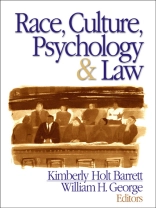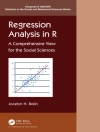‘In a diverse democracy, law must be open to all. All too often, however, our system of justice has failed to live up to our shared ideals, because it excludes individuals and communities even as they seek to use it or find themselves caught up in it. The research presented here offers hope. The abstract doctrines of the law are presented through real cases. Judges, lawyers, scholars, and concerned citizens will find much in these pages documenting the need for reform, along with the means for achieving our aspirations. The issues presented by race, ethnicity, and cultural differences are obviously central to the resolution of disputes in a nation made up of people who have in common only their faith in the great experiment of the United States Constitution. Here the challenges are met in an original, accessible, and thoughtful manner.’
-Frank H. Wu, Howard University, and author of Yellow: Race in America Beyond Black and White
‘Kim Barrett and William George have taken on an enormous task, which is matched only by its timeliness. Cultural competence and cultural diversity pass off our lips as eternally valued ideals, but Barrett and George have brought a critical and edifying eye to thee ideas. Racism is similarly easy to acknowledge but difficult to account for in the everyday lives of ordinary people of color. What we discover in this impressive volume is not only that race and culture matter, but how they matter in the minds of people who are clients and the minds of people who attempt to serve them and in the courts of law that attempt to mete out justice. Race, Culture Psychology and the Law is essential reading for anyone with a professional or personal interest in social justice and psychological well-being.’
-James M. Jones, Ph.D., Director, Minority Fellowship Program, American Psychological Association
‘This is an extraordinary and daring compilation of cutting edge commentaries that should prove invaluable to students, scholars, and practitioners working in social work, clinical and forensic psychology, juvenile justice, immigration adjustment, Native American advocacy, and child and adult abuse. It is a quality text that tackles key topics bridged by psychology and the law with clarity, succinctness, complexity, and evenhandedness.’
-William E. Cross, Jr., Ph.D., Graduate Center, City University of New York
American ethnic and racial minority groups, immigrants, and refugees to this country are disparately impacted by the justice system of the United States. Issues such as racial profiling, disproportionate incarceration, deportation, and capital punishment all exemplify situations in which the legal system must attend to matters of race and culture in a competent and humane fashion.
Race, Culture, Psychology, and Law is the only book to provide summaries and analyses of culturally competent psychological and social services encountered within the U.S. legal arena. The book is broad in scope and covers the knowledge and practice crucial in providing comprehensive services to ethnic, racial, and cultural minorities. Topics include the importance of race relations, psychological testing and evaluation, racial ‘profiling, ‘ disparities in death penalty conviction, immigration and domestic violence, asylum seekers, deportations and civil rights, juvenile justice, cross-cultural lawyering, and cultural competency in the administration of justice.
Race, Culture, Psychology, and Law offers a compendium of knowledge, historical background, case examples, guidelines, and practice standards pertinent to professionals in the fields of psychology and law to help them recognize the importance of racial and cultural contexts of their clients. Editors Kimberly Holt Barrett and William H. George have drawn together contributing authors from a variety of academic disciplines including law, psychology, sociology, social work, and family studies. These contributors illustrate the delivery of psychological, legal, and social services to individuals and families-from racial minority, ethnic minority, immigrant, and refugee groups-who are involved in legal proceedings.
Race, Culture, Psychology, and Law is a unique and timely text for undergraduate and graduate students studying psychology and law. The book is also a vital resource for a variety of professionals such as clinical psychologists, forensic psychologists, psychiatrists, counselors, social workers, and attorneys dealing with new immigrants and people from various ethnic communities.
Tabella dei contenuti
Part I – Forward – Stan Sue and Ron Mamiya
Part II – II. The Need for Cross-Cultural Competence in Psychology and the Law: Introduction & Overview – Kimberly Holt Barrett and William H. George
Part III – III. Race and Justice
Chapter 1. Psychology, Justice, and Diversity: Five Challenges for Culturally Competent Professionals – Kimberly Holt Barrett and William H. George
Chapter 2. Case Examples: Addressing Racism, Discrimination, and Cultural Bias in the Interface of Psychology and Law – Kimberly Holt Barrett
Chapter 3. Judicial Colorblindness, Race Neutrality, and Modern Racism: How Psychologists Can Help the Courts Understand Race Matters – Kimberly Holt Barrett and William H. George
Chapter 4. Five Habits for Cross Cultural Lawyering – Susan Bryant and Jean Koh Peters
Chapter 5. Race, Community, and Criminal Justice – Anthony V. Alfieri
Chapter 6. Trials and Tribulations of African Americans in the Courtroom: Refuting the Myths – Rudolph Alexander, Jr.
Chapter 7. Working With African American Children and Families in the Child Welfare System – Marian S. Harris and Ada Skyles
Part IV. Assessment
Chapter 8. Guidelines and Suggestions for Conducting Successful Cross Cultural Evaluations for the Courts – Kimberly Holt Barrett
Chapter 9. The Consequences of Racial and Ethnic Origins Harassment in the Workplace: Conceptualization and Assessment – Maria P. P. Root
Chapter 10. Cross-Cultural Forensic Neuropsychological Assessment – Tedd Judd and Breean Beggs
Chapter 11. Working with Interpreters – Rachel Tribe
Chapter 12. Assessment of Asylum Seekers – Debra Freed
Chapter 13. Evaluating Child Abuse in Children Who Seek Asylum: Four Cases Studies – Ellen G. Kelman
Part V. Immigration
Chapter 14. Enhancing the Well Being of Asylum Seekers & Refugees – Angela Burnett and Kate Thompson
Chapter 15. The Challenges and Potential Solutions to the Trafficking of Women and Children: An Overview – Sutapa Basu
Chapter 16. From Refugee to Deportee: How U.S. Immigration Law Failed the Cambodian Community – Jay Stansel and Dori Cahn
Part VI. Working with Children and Families
Chapter 17. Asian American/Pacific Islander Families in Conflict – David Sue
Chapter 18. The Challenge of Cultural Competence: Working with American Muslims and their Families – Bahira Sherif-Trask
Chapter 19. Unaccompanied Children in the US: Legal & Psychological Considerations – Dana Chou
Chapter 20. American Indian Families: Resilience in the Face a Legal, Economic, and Cultural Assault – Walter Kawamoto and Tamara Cheshire
Part VII. Juveniles
Chapter 21. Race Disparities in the Juvenile Justice System – Eileen Poe-Yamagata and Madeline Wordes Noya, Ph.D.
Chapter 22. A Cultural Approach for Promoting Resilience among Adjudicated Mexican American Youth – Felipe González Castro
Chapter 23. Law And Social Identity And Its Effects On American Indian And Alaska Native Youth – Joseph E. Trimble and Robin A. Ladue
Chapter 24. The Impact of the Juvenile Prison on Fathers – Anne Nurse
Part VIII. Violence
Chapter 25. Immigrant Women & Domestic Violence – Jeanette Zanipatin, Stacy Shaw, Patty Bardina, and Jean Yi
Chapter 26. Race and Sexual Offending: An Overview – Jennifer Wheeler and William H. George
Chapter 27. Culturally Competent Approaches to the Assessment and Treatment of Sexual Abusers – Rachel E. Goldsmith, Gordon N. Hall, Jennifer Wheeler and William H. George
Chapter 28. Advocacy in the Legal System: Cultural Complexities – Kari A. Stephens, Sandra Ibarra, and Kim Moore
Chapter 29. Immigration and Hardship: Living With Fear – Sonia Carbonell
Circa l’autore
Bill George is an associate professor in the psychology department and his area is adult clinical with specialty in alcohol abuse, addiction and sexual assault. He also has a background in corrections, following his bachelor’s degree with c0-majors in psychology and criminal justice.












